By Michael Streeter and Graham Tearse
Socialist Party candidate François Hollande has won the French presidential elections. Official results announced by the interior ministry at 1 a.m. Monday gave Hollande a 51.67% share of the vote in mainland France, but excluding the results from French expatriate votes. Nicolas Sarkozy, credited by the interior ministry with 48.33% of votes cast, has announced he is quitting front-line politics.
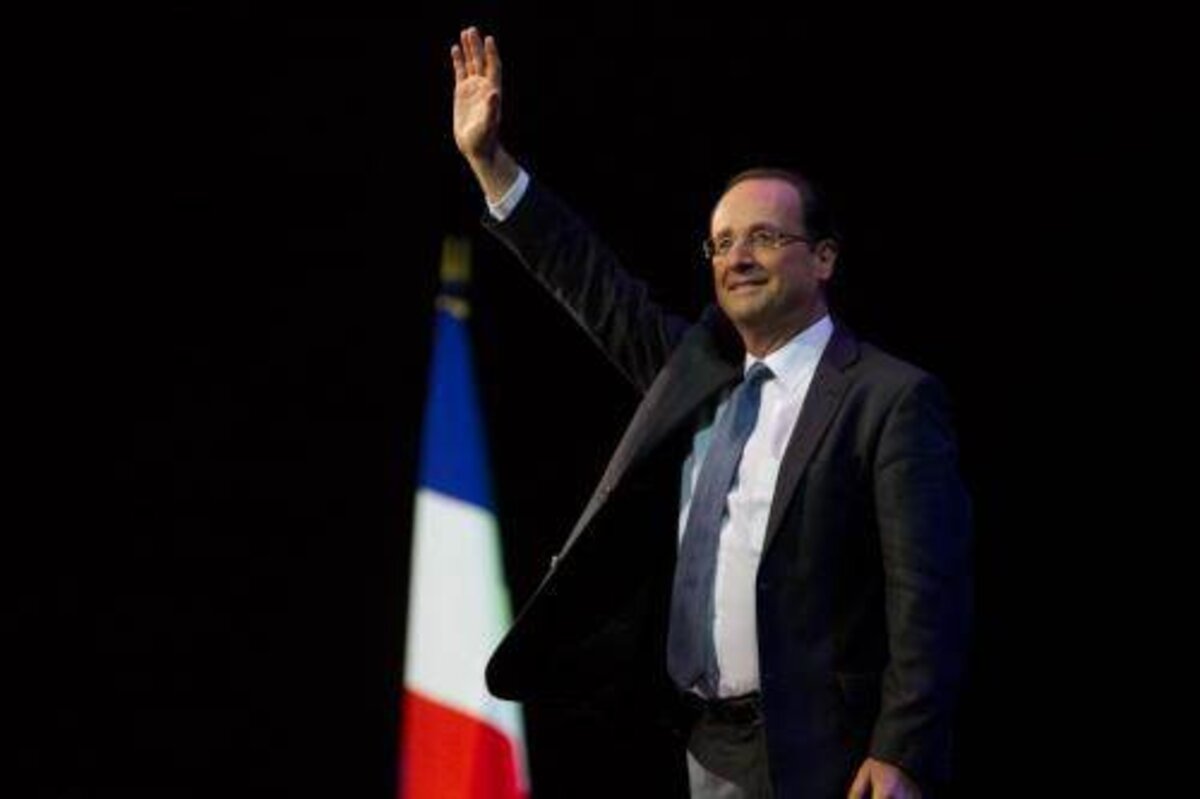
“I have confidence in France, I know it well, I know we are capable of straightening ourselves up," Hollande said in a victory speech on Sunday evening. “It is this French dream that I will make it my job to accomplish."
Sarkozy, speaking earlier before supporters in Paris, said “I take full responsibility for this defeat” and called on the Right to stay united ahead of parliamentary elections in June.
Hollande’s victory is the first time a socialist has been elected president since François Mitterrand won a second term of office in 1988. It ends 17 years of uninterrupted conservative occupancy of the post, beginning with Jacques Chirac in 1995.
Hollande, 57, will now formally enter office mid-May, when he will appoint a prime minister to form a caretaker government until parliamentary elections are held in June.
US President Barack Obama called Hollande by phone to congratulate him and invited the new French president to talks on international issues later this month at the US presidential retreat at Camp David and to the NATO summit in Chicago, also in May. In a statement, the White House said Obama had "indicated that he looks forward to working closely" with Hollande on a "range of shared economic and security challenges".
The four exit poll surveys conducted Sunday gave the following results: Harris Interactive/Viadeo and Ipsos both saw Hollande at 51,9% Sarkozy on 48,1%. CSA credited Hollande with 51,8%, Sarkozy at 48,2 %, TNS-Sofres/Sopragroup gave Hollande 52% and Sarkozy 48%. The final official results will be known by early Monday afternoon.
“Before you, I commit myself to serve my country with the devotion and exemplarity that the [presidential] function requires,” said Hollande in a victory speech, some one and a half hours after the first results came in, from his parliamentary constituency in Tulle, east-central France. “I am proud of having been able to give hope. The change that I propose to you must meet the level required of France. It begins now.”
“On this same day that the French have appointed me, I ask to be judged upon two major commitments; justice and the young,” he continued.
“I have confidence in France, I know it well, I know we are capable of straightening ourselves up,” he continued.
“It is this French dream that I will make it my job to accomplish. But today, although responsible for the future of our country, I also realise that Europe is watching us. And I think in a number of European countries it has been a relief, a hope. The idea that austerity is no longer a fatality.”
“We are not any old country. We are France […] The 6th of May must be a major date for our country. The mandate you have given me is a weighty one, it is grand, it is wonderful.” Immediately after delivering his speech, which ended with a musical send-off by an accordion player, Hollande left Tulle by private jet for Paris, where his first official appearance was a speech, with a voice hoarse from months of campaigning, before the crowds of supporters celebrating at the Place de la Bastille.
Taking to the podium at the Bastille square at 12.40 a.m., Hollande said he said he hoped his election would herald political change in Europe, and exhorted France to be "proud", and mutually "respectful". His speech ended with a thunderous rendering of the French national anthem, La Marseillaise.
Some four hours earlier, on Sunday evening, in his speech accepting defeat, Sarkozy revealed that he had already spoken to Hollande on the phone and said he "wished him good luck".
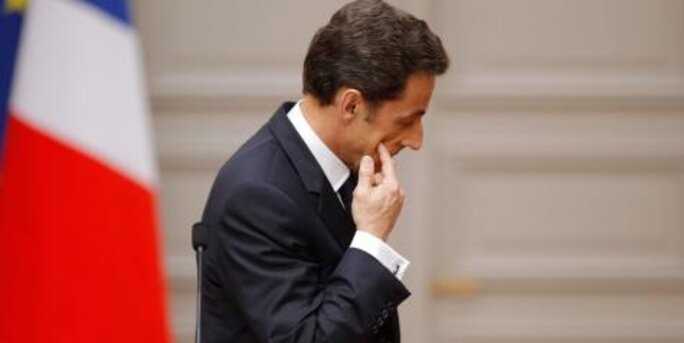
Speaking to party supporters at the Mutualité meeting hall in the Latin Quarter in Paris, the outgoing president said: “I take full responsibility for this defeat.” He had, he told them, “done my best to protect the French people”.
He added: “The people of France have made their choice. François Hollande is the president of France and must be respected.”
Speaking about his own future Sarkozy said his days as a front-line politician were over “after 35 years of holding political offices”. He said: “I am ready to become again a Frenchman among other French people.
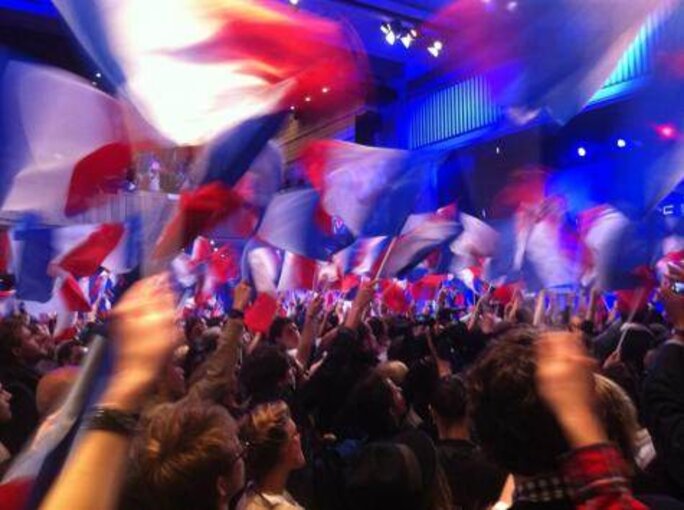
“Another era is underway, and in this new period I will remain one of your own. You can count on me but my position will never be the same.” Sarkozy thanked the “millions” who had voted for him and told his supporters: “I could never give you what you have given me.”
Earlier Sarkozy told senior figures in his ruling UMP party that he "would not head" the party's campaign in June's legislative elections. "Don't split, stay united," the outgoing president told colleagues at the presidential office, the Elysée Palace. "We have to win the legislative battle, it is winnable." And referring to his share of the vote in the election he said: "It's an honourable score."
Meanwhile a jubilant crowd of tens of thousands roared, shouted and waved flags in celebration at the Place de la Bastille in central Paris, where the Socialist Party had organized a mass open air party that lasted well into the night.
In sharp comparison, there was a deserted scene, on a a cold and wet May evening, at the Place de la Concorde, close to the Champs-Elysées avenue, the post-election celebration site chosen by Sarkozy’s ruling UMP party.
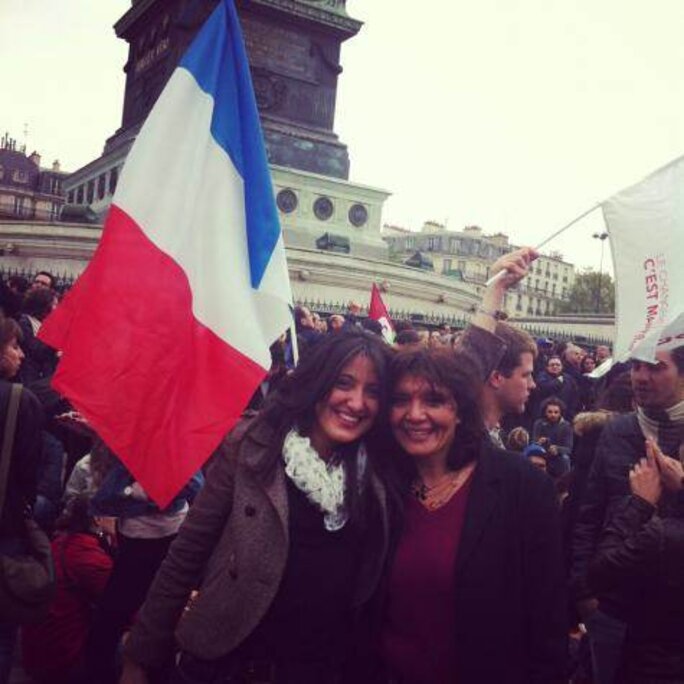
“France has refused the drift of Sarkozy-ism and chosen to take its destiny in its hands,” said Socialist Party deputy leader Harlem Désir. “It is the end of arrogance, this May 6th is a day of victory for every republican.”
Radical-left candidate Jean-Luc Mélenchon, eliminated in the first round with a score of just more than 11% but who insisted, Sunday evening, that his electorate's subsequent support for Hollande proved decisive, declared: “A page is turned, another begins, full of demands […] Sarkozy, it's finished, at last. Thus the score is settled with the grave-digger of the acquired social rights and public services of our republic […] his defeat is that of his plan to drift far-right. It is very good news for France and for Europe.”
Mélenchon was referring to Sarkozy's overt and controversial attempts since the first round to win support from the far-right electorate, notably targeting immigration, and which drew strong criticism from both the Left and members of Sarkozy's ruling Right majority. Far-right Front National party candidate Marine Le Pen came in third position in the April 22nd poll, scoring a historic high for the party at almost 19% of the vote.
“The result this evening is a victory for all ecologists,” commented Cécile Duflot, leader of the EELV Green party. “The accession to the presidency of François Hollande is an opportunity for France, for ecology, for social justice and democracy.”
The estimates, which are traditionally accurate to within a percentage point, were taken from the results of exit polls at polling stations that closed at 6p.m. Voting in France's major cities continued until 8p.m.
The final turnout rate was estimated at between 80%-82%. Earlier in the day, the interior ministry reported turnout at just under 72% at 5pm, less than the second round of the 2007 elections, but up on that recorded during the first round voting on April 22nd.
Sunday night’s result saw Sarkozy, also 57, become the first incumbent candidate to lose a second bid for office since 1981 when Valérie Giscard d’Estaing was defeated by Mitterrand.
Hollande has led his campaign on a manifesto that promises to buffer the effects of the economic crisis on the worst-off and middle income earners by increasing the tax burden on the wealthy, favouring economic growth measures over austerity programmes, the hiring of some 60,000 new teachers and also to reduce the minimum retirement age for some professional categories from 62 to 60. Importantly, Hollande has vowed to re-negotiate the terms of the EU fiscal compact treaty, seeking a softening of required budgetary criteria that are locked into austerity measures.
The outgoing government, though, believes the new head of state is in for a rude awakening over the economic and financial problems that France faces. Budget minister Valérie Pécresse said on Sunday night: “The opposition campaigned denying the financial crisis. That crisis will catch up with us – it will catch up with us from tomorrow.”
Sarkozy, who with German Chancellor Angela Merkel is one of the architects of the austerity-driven fiscal compact, has championed the need for further reforms to reduce France’s deficit, reducing the public sector payroll, and has laboured the issue of illegal immigration, announcing plans to further toughen up immigration controls and the rights of non-EU foreign workers arriving in France.
But while the main issues of the campaign centred upon the handling of the economic crisis, with the sharply rising unemployment figures and the diminishing purchasing power of France’s low- and middle-income earners at the fore, Sarkozy’s candidature was significantly weighed down by his personal unpopularity - exacerbated amid a tense social climate by what became dubbed as a ‘bling-bling’ lifestyle and his closeness to some of France’s wealthiest individuals - and a series of corruption scandals.
German foreign affairs minister Guido Westerwelle, speaking at a reception Sunday at the French embassy in Berlin, described Hollande’s election as “a historic event” for France, dismissing fears that the close political alliance established between Sarkozy and Chancellor Angela Merkel, who campaigned for Sarkozy’s re-election, would leave Franco-German cooperation under strain. That cooperation did “not depend on parties”, Westerwelle insisted, “but is based much more profoundly, in the peoples themselves”.
“We will work together on a growth pact,” he added. “We must add new impetus to growth, which comes through structural reforms,” he said. But he gave a veiled warning that “when comes the moment of decision-making, we are aware of our responsibilities, not only for one’s own country but [also] for Europe.”
Hollande’s election campaign director, Pierre Moscovici, announced Sunday evening that Chancellor Merkel had called the newly-elected president to congratulate him and had invited him to a meeting in Berlin.
After Sarkozy's announcement that he would not lead the UMP into next month's crucial legislative elections, senior party figures repeated the outgoing president's call for unity amid fears that the Right could split over Sunday’s defeat. “There was no anti-Sarkozy tsunami,” said current foreign minister and mayor of Bordeaux Alain Juppé. “We are launching the battle for the legislative elections.”
At the Mutualité, UMP Member of Parliament Franck Riester said that after defeat in the second round of the presidential poll the Right needed to do well in the parliamentary elections to provide a counter-balance to the new presidency. "We must all unite behind the 577 candidates for the 'third round' that are the legislative elections,” he told Mediapart, also claiming that a winning score of 52% of the vote for Hollande was “not a tsunami”.
The head of the UMP, Jean-François Copé, called for a “mobilisation” for the June elections as he heaped praise on Sarkozy, describing him as “an exceptional man” and a “great statesman”. Outgoing ministers Xavier Bertrand and Nadine Morano also praised the president before calling for unity.
However, there were already signs of splits on the Right, especially over the election strategy formulated by Sarkozy's controversial advisor Patrick Buisson, which was to focus on issues such as immigrations and crime which were of main concern to voters on the political Right, including supporters of the far-right National Front.
The UMP's national secretary David-Xavier Weiss said the strategy had been a “total failure”. Former UMP spokesman Dominique Paillé , who quit the party last year and is now standing as a parliamentary candidate for the Radical Party, said: “Presidential elections are won in the centre. Nicolas Sarkozy never wanted to take that into account. He was wrong.”
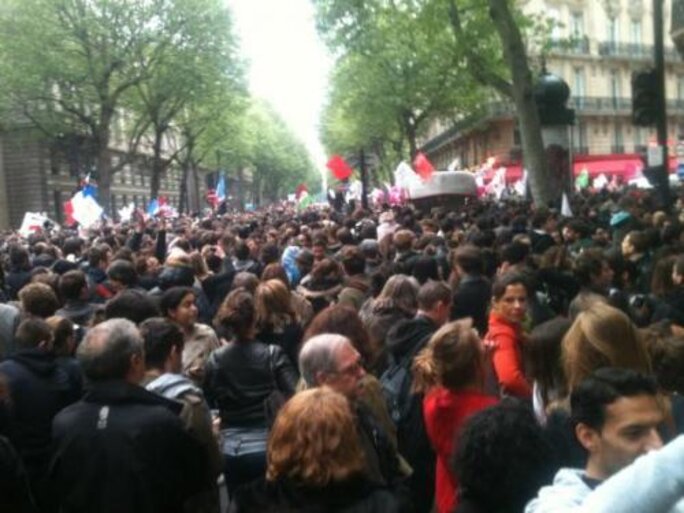
Meanwhile, at Socialist Party headquarters on the rue Solférino in Paris, close to the French parliament buildings, where a crowd of several hundreds had gathered from early in the evening, the exit poll results at 8pm were met with a burst of loud cheering, shouts of “We’ve won, we’ve won” and a popping of champagne bottles.
“We've never known this, we’re the 2002 generation,” commented one young man in the crowd, referring to the presidential elections ten years ago that saw a final round play off between conservative Jacques Chirac and far-right candidate Jean-Marie Le Pen. Chirac won a landslide victory, thanks in large part to supporters of the Left after Socialist Party candidate Lionel Jospin's shock elimination in the first round. A significant part of the left-wing vote were spread, in protest at utgoing Prime Minister Jospin who was seen as veering to the Right, to the minority candidates of the Left, allowing Le Pen to take second place.
“In '81 it was the first victory, we were almost surprised,” Jean-Michel Baylet, a senator for the Radical Left party, also among the crowd, told Mediapart, referring to François Mitterrand’s election as France’s first socialist president. “”Here we could feel, as the months passed, that the atmosphere was good. François Hollande led an admirable campaign, he never varied. Now we need to unite the French, to show each one that they have respect.”
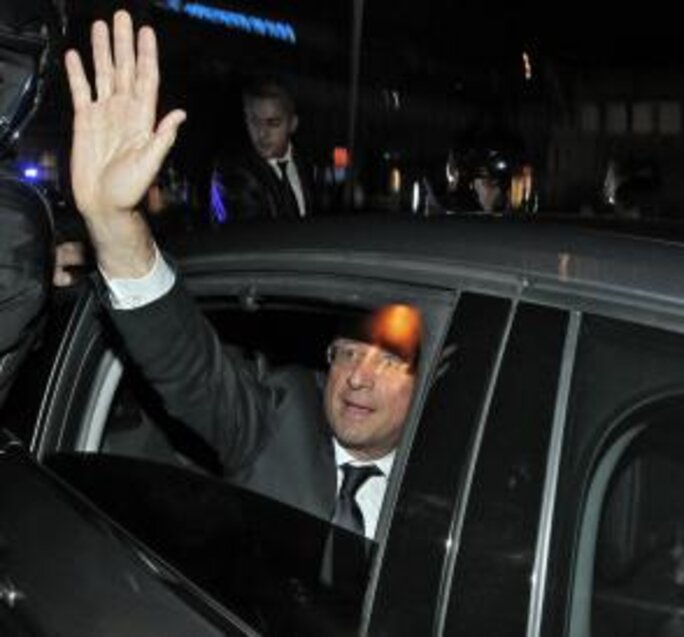
While Sunday's vote was for many an expression of the electorate's rejection of Sarkozy above a fervour for Hollande, it was nevertheless an immense personal triumph for Hollande. The MP and former First Secretary of the Socialist Party has never served in government, and his perceived lack of charisma and genteel nature was viewed as a significant handicap even among his own supporters. Few would have credited him with any serious chance of becoming the socialist candidate before last summer, when the party’s favourite for the post, former IMF chief Dominique Strauss-Kahn, was cast out of politics by a series of sex assault allegations.
Hollande was chosen as socialist candidate in party primaries held last October, after a final play-off with the party’s First Secretary Martine Aubry. He was the Socialist Party First Secretary from 1997 until 2008, when he stood down in elections and was succeeded by Aubry.
A graduate of France’s elite ENA school, the top national training institute for senior civil servants from which many of France’s post-war political figures have emerged, Hollande initially served several posts as a government advisor under Mitterrand in the early 80s, notably on economic questions. He was first elected as an MP in the Corrèze département (equivalent to a county) in 1988, a seat he lost in 1993. He was re-elected in the Corrèze in 1997 and has kept his seat, through two elections, until now. Since 2008, he is also president of the Corrèze general regional council.
Born on August 12th 1954 in Rouen to parents he has described as “always talking politics”, Hollande's father was an ENT doctor who stood twice as a Far Right candidate in local elections, a fierce opponent of President Charles de Gaulle's decision to grant independence to Algeria, while his mother was a left-leaning social services worker who late in life became a Socialist Party candidate in local elections in Cannes.
For some 25 years, Hollande was the companion of Ségolène Royal, a fellow ENA graduate who began a ministerial career under François Mitterrand and who was chosen as the Socialist Party’s presidential candidate in 2007, with whom he has four children. The couple separated in 2006, but only announced their split after Royal lost to Sarkozy in the 2007 elections. Hollande officially announced his relationship with his current companion, Valérie Trierweiler, a journalist with Paris-Match magazine, in 2010.
Hollande had consistently led opinion poll predictions all through the campaign, although early forecasts of a landslide victory over Sarkozy narrowed significantly in the final days. In the first round, Hollande won 28.6% of the vote, ahead of Sarkozy on 27.2%.
- This article was last updated at 2 a.m. ECT on Monday May 7th.
-------------------------
See also:
Watershed moment for Europe as France and Greece head for the polls
The bumper photo album of the French presidential election campaign
Portraits of protest in France 2007-2012
Former Libyan PM confirms Gaddafi gave Sarkozy 50M euros for election campaign


